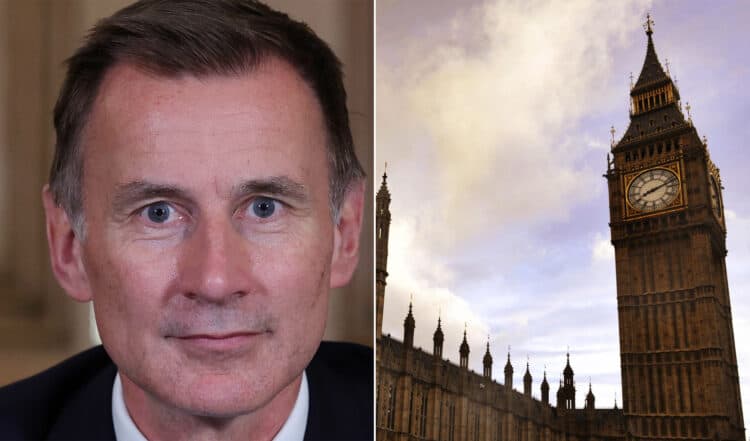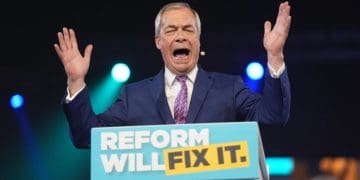Chancellor Jeremy Hunt has announced his financial update in his Autumn statement.
Giving her reaction to the statement, Labour’s Rachel Reeves said working people are “worse off” despite the Government’s promises – and said voters would not trust the Tories to “fix” problems faced by the NHS and other services.
The Office for Budget Responsibility has warned that living standards could be lower in 2024/25 than before the pandemic.
If that proves to be the case, it represents “the largest reduction in real living standards since records began in the 1950s”.
Here are the main points, and snap reactions to Hunt’s announcement.
Autumn statement
Here are the main points…
Personal tax
The Chancellor will cut the main 12% rate of employee national insurance contributions by two percentage points to 10%.
This tax cut will be brought in from 6 January 2024.
He claims this will affect 28 million people, saving someone on the average salary £450.
Growth
The chancellor says forecasts from the Office for Budget Responsibility show the economy will grow by 0.6% this year and 0.7% next.
It is now 1.8% larger than it was before the Covid-19 pandemic, according to the official figures, Hunt claimed.
Inflation is expected to fall to 2.8% by the end of 2024 according to the spending watchdog, down from 11.1% last year when Hunt and Sunak took office.
GDP will then grow 1.4% in 2025, and 1.9% in 2026 and 2% in 2027 and 1.7% in 2028.
Earlier in the year, the OBR had forecast the economy would shrink by 0.2% in 2023, before growing by 1.8% in 2024, 2.5 % in 2025, 2.1% in 2026 and 1.9% in 2027.
The wider picture of “slower growth from a higher starting point” means that compared with March, the OBR only improved its forecast for GDP growth in 2027 by 0.6%.
Inflation
Inflation is expected to fall to 2.8% by the end of 2024 according to the spending watchdog, down from 11.1% last year when Hunt and Rishi Sunak took office.
The spending watchdog now expects inflation to stay “higher for longer” and that it will not drop to the Bank of England’s target of 2% until mid-2025. This is a year later than it expected in March.
Welfare
Under the back-to-work plan, the sick note system will be changed, to assume that people can work. The work capability assessment will be changed. And more support will be offered of people going into work.
The government will ask for something in return, he said.
If after 18 months of help, there will be mandatory work experience. And if people do not participate, the government will close the case and stop their benefits.
He says the OBR thinks this will get another 200,000 people into the workforce.
People claiming benefits will face mandatory work experience if they do not find a job within 18 months.
National Living Wage
The “national living wage” will increase by more than a pound an hour from April to £11.44. It will also be extended to 21-year-olds.
Benefits will be increased by 6.7%, and there will be tougher requirements for those who claim them to look for work.
The state pension will be increased by 8.5%.
Hunt said he will increase the local housing allowance, which has been frozen since 2020, in a measure worth £800 for some households next year.
Borrowing
Hunt said headline debt is to be worth 94% of GDP by the end of the forecast period, lower than forecast by the OBR in March.
In cash terms, the OBR estimates the budget deficit – the gap between spending and income – is 4.5% of GDP in 2023-24.
In its previous forecasts in March, the OBR had estimated borrowing would be 5.1% of GDP or £132bn in cash terms, in 2023-24.
Overall, the OBR says that the course for borrowing in the next five years is “little changed” from March, as any improvement has been wiped out by the chancellor’s new measures.
Business tax
Hunt will make so-called “full expensing” permanent. This allows businesses to offset investment in items such as new IT equipment and factory machinery against tax.
The chancellor said that the total package of measures will help increase business investment by about 1% of GDP.
Hunt said he wants to reform taxes paid by self-employed people, and will abolish their “class 2” national insurance contributions, which count towards their state pension entitlements. This will cut taxes for 2 million people, he said.
“Class 4” contributions will be cut by one percentage point. Together these will be worth £350 a year. There will be a business rates discount for hospitality retail and leisure worth £4.3bn.
Economy
The chancellor will invest an extra £4.5bn between 2025 and 2030 in manufacturing.
About £1m will go to aerospace companies and businesses working on green technologies.
Hunt said he will accept recommendations from a review of foreign direct investment into the UK, carried out by former business minister Lord Harrington.
He says there will be a new “investment zone” in Wrexham, Wales, in a bid to increase employment in the area. There will be three others in England: Greater Manchester, and the west and east Midlands.
Environment?
Jeff Knott, director of policy and advocacy at the RSPB, said: “Nature is in crisis, yet the UK Government is silent. With barely a word in the Autumn Statement about actions to tackle the nature and climate emergency, it is hard to see how we can get nature’s recovery on track in time for 2030.
“The natural world underpins everything in our lives, including the economy, and there is strong evidence to show that investing in nature improves our long-term economic performance. This was a chance for Chancellor Jeremy Hunt to prove that the UK government is committed to promises made to protect and restore 30% of our land and sea by 2030. There was rightly a push for better infrastructure and housing, but there was nothing about how these can help drive nature’s renewal.
“We’re already one of the most nature-depleted countries on the planet and political inaction is helping push our natural world to the brink. We urgently need all our politicians to speak up and act. Nature can’t wait any longer.”
Snap reactions
1.
2.
3.
4.
5.
6.
7.
8.
9.
10.
Or simply…
Related: Jeremy Hunt claims about UK economy fools NOBODY – Reactions







